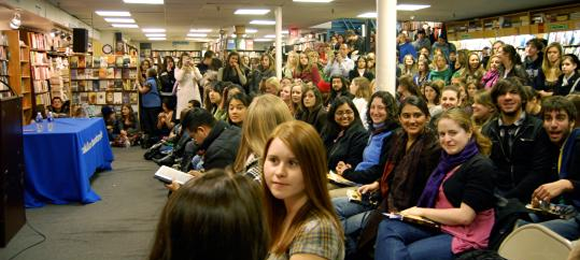

The local independent bookstore is like the American Bald Eagle. Its an iconic symbol of our culture, but for over two decades its ranks have been decimated by eCommerce, big box retailers, and now digital downloads, to the point that they’re nearly instinct. Given this bleak prognosis, many just considered the independent bookstore dead and moved on. But not so fast, as reported by RetailWire, like the Bald Eagle the local independent bookstore is back. They’re surviving by adapting and occupying a position that their national and Internet competition can’t, being more local and more relevant.
The Near Death Experience
It seems funny to remind people that Amazon.com, seller of all things, started in books. So, if there’s one independent retail catagory most likely effected by eCommerce its local independent bookstores. If the online threat wasn’t enough, these bookstores also were impacted by the rapid growth of big box consumer media retailers like Borders and Barnes and Noble, who offered huge selections, discounted prices, and a nice, albeit cookie-cutter, shopping experience. To make matters worse the independent bookseller was more expensive, undifferentiated, poorly operated, and rarely marketed. Many went out of business, and all were put under intense pressure to adapt or die.
The Local Bookstore Renaissance
The remaining local bookstores adapted, got smarter with marketing and operations, and then doubled-down on their unique advantage of being more local and more relevant. The good news is that these independents are starting to turn things around, the Strand Bookstore reported on Twitter their “best sales day in the history of 86 years at the store.” Publishers are starting to notice, “(w)hile pointing out that independents were seeing ‘a nice renaissance,’ Jennifer Enderlin, the publisher of St. Martin’s Press Paperbacks and Griffin.”
Some additional reasons for this “renaissance” are outlined in the RetailWire piece:
In an interview with The Atlantic in early December, Oren Teicher, CEO of the American Booksellers Association, pointed to a few other reasons why independent book sellers have bounced back over the last three years. They include:
- ⦁ Being able to tap into the overall “shop local” movement, much like farmer’s markets;
- ⦁ Publishers recognizing their value and working more closely with indies after the exit of Borders and challenges of Barnes & Noble, and;
- ⦁ Technologies that help stores with out-of-stocks, labor, and social-media outreach.
The Death of Big Box Media Retailers
As Amazon and rest of the Internet drove down prices on physical books and how the entry of tablets and smartphones made all media downloadable, the role of the big box as the one-stop consumer media retailer is done. They occupied the unenviable middle position of being neither the cheap big catalog of Amazon.com, nor the cute local bookstore with author readings and book clubs. Even Barnes and Noble is exacerbating the digital download trend by introducing their Nook digital eReader and tablet.
Today Borders is done, and Barnes and Noble is circling the drain. So the death of the bookstore is more about the death of the big box bookstore than of the local independent. It all makes sense. Why go to a big sterile Barnes and Noble when you can just download the same content to your mobile device? But, to go to Main Street, get a book signed by a local author, sip an expertly crafted latte, all while smelling that fresh paper smell found only at a bookstore, it’s a totally different sensory experience – impossible to synthesize digitally.
The Role of the Brands and the Future
From a local retail marketing perspective, the important change is the accessibility of local marketing tools for these independent businesses. Being big and national makes it easier to buy products cheaper, but it’s difficult to be local and relevant. The role of brands, such as book publishers is critical to the success of local retailers. The more they can do to support local retailers, the better their margins will be. So, the brands have a vested interest to support their local retailers (ahem…shameless Promoboxx plug).
It’s clear that the Internet will continue to gobble up the bottom end of the consumer market, but when it comes to upmarket retail the local independent stores can establish and maintain a strong position. Given that most consumer media, such as books, can be transmitted digitally, if the independent bookstore can survive then all other independent retailers have a fair shot. So, this is good news for independent shoe stores, appliance dealers, bike shops, car dealers, carpet stores, tire shops, etc.
So, Amazon and the rest of you, watch out for local retailers.
BC

